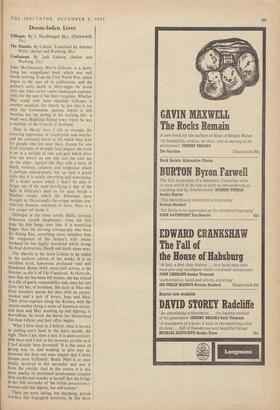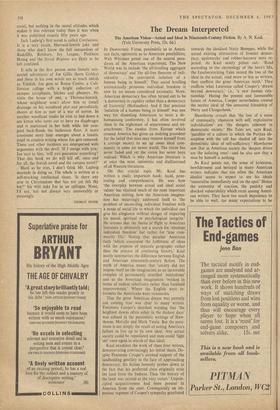Doom-laden Lives
Confusions. By Jack Ludwig. (Seeker and Warburg, 21s.) JOHN MACDOUGALL HAY'S Gillespie is a horri- fying but magnificent book which was well worth reviving. Even the First World War, which began in the year of its publication, and the author's early death at thirty-eight—he wrote only one other novel—seem inadequate explana- tions for the way it has been forgotten. Whether Hay could ever have equalled Gillespie is another question, for clearly he put into it not only the tremendous passion which it still breathes but the setting of his working life: a small west Highland fishing town where he was a minister of the Church of Scotland.
Only in Hardy have I felt so strongly the lowering oppression of countryside and weather and the continual threat to life which they hold for people who live near them. Except for one brief interlude of drought (and plague) the book is set in a twilight of rain and gale which drive over the moors on one side and the cold sea on the other. Against this Hay tells a -story of death, violence, calamity and vengeance which is perhaps melodramatic but on such a grand scale that it is totally absorbing and convincing. Of a dozen scenes which I shan't be able to forget one of the most horrifying is that of the fight in Gillespie's shed on the quay beside a headless corpse which the fishermen have brought in. Occasionally the corpse writhes con- vulsively because, unknown to them, there is a live conger eel inside it.
Gillespie is the town tyrant. Bully, coward, fisherman turned shopkeeper, from the first Page his fate hangs over him. It is something bigger than the starving townspeople who burn his fishing fleet, something more relentless than the vengeance of the farmer's wife whose husband he has legally murdered which brings his final destruction. Death and death alone wins.
The Shackle is the latest Colette to be added to the uniform edition of her works. It is an excellent book, humorous, profound—and well translated. Renee Nerd, music-hall actress, is the heroine, as she is of The Vagabond. At thirty-six, now that she has been left money, she has retired to a life of gentle respectability and, since her last lover left her, of boredom. She stays at Nice and from boredom spends her days with an opiuni- smoker and a pair of lovers, Jean and May. Their drive together along the Riviera, with the opium-smoker doing a series of historical mimes, and Jean and May standing up and fighting, is marvellous. In revolt she leaves for Switzerland but Jean follows and their affair begins.
'What I. have done is, I believe, what is known as putting one's head in the lion's mouth. All right. There I am, there I stay. It is quite comfort- able there and I feel, at the moment, as calm as if I had already been devoured.' It is this sense of giving way to, and wanting to give way to, someone she does not even respect that Colette creates most brilliantly. Renee Nerd is at once totally involved in her surrender and sees it from the outside. And in due course it is this same quality of emotional involvement coupled with intellectual wonder at herself that she brings to her full surrender of 'the brittle possessions a woman calls her dignity, her self-esteem.'
There are some dating, but charming, period touches, like begoggled motorists, in this short novel, but nothing in the moral attitudes which makes it less relevant today than it was when it was published exactly fifty years ago.
Jack Ludwig's first novel is called Confusions. It is a very inside, Harvard-Jewish joke and those who don't know the full innuendoes of -Radcliffe, Roxbury, Ivy League, Pinkham Housg and the Social Register are likely to be left confuSed.
It tells in the first person some loosely con- nected adventures of Joe Gillis (born Galsky) and these in his own words are as much iddish as Yiddish. Joe goes to Royce Centre, a Cali- fornian college with a bright collection of campus sycophants, bitches and phoneys. He visits the house of one, a Thoreau-beatnik, whose neighbour won't allow him to install drainage on his woodland plot and periodically shoots at him as part of a war of nerves. In another woodland studio he tries to bed down a sex kitten who turns out to have no diaphragm and is marooned in her bath while her cess- pool back-floods the bathroom floor. A more consistent story later emerges about a lunatic pupil in creative writing whom Joe gets removed. These and other incidents are interspersed with arguments with the devil. 'If I merge with you,' Joe says to him, 'will you guarantee something? That this book we do will kill off, once and for all, the Jewish novel and the campus novel?'
Hard as he tries, I don't think Mr. Ludwig succeeds in doing so. The whole is written at a self-mocking intellectual shout. 'Is. there any arse in Christendom that has not yet felt thy toe?' his wife asks Joe in an epilogue. None, I'd say, but not always very memorably or amusingly.
THOMAS HINDS







































 Previous page
Previous page